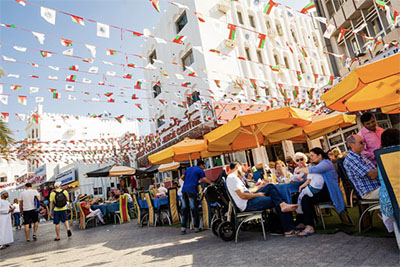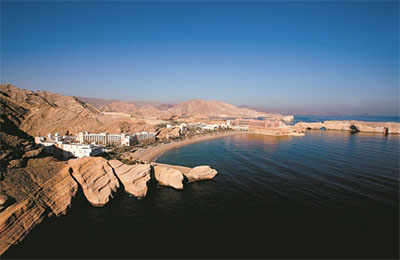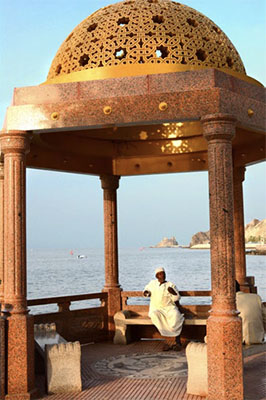AMID THE CHAOS AND CONFLICT of the Middle East, Muscat, Oman, has been a stable oasis. Surrounded by mountains and desert, jutting into the Gulf of Oman as it narrows into the Strait of Hormuz, the city’s strategic location and maritime tradition have made it an important trading port since early history, when it was a source of copper, gold and treasured frankincense. Described in a 1790 British East India Company report as “one of the most important cities in Asia,” it is recovering from an early-20th-century decline and is said to be undergoing a renaissance.
A hub of local and international activity and the flagship of Oman’s 11 governorates/regions, Muscat is the heart of the country’s political, economic and administrative system. One-third of the 4.5 million Omani people reside within Muscat’s six provinces, or wilayats. Technically encompassing 1,400 square miles, the city includes three primary urban areas. Muscat proper is a small enclave of restored historic homes and buildings. The original harbor, Muttrah, transformed into a waterfront tourist mecca, while the commercial district centered in ancient Ruwi upgraded to accommodate the headquarters of banks and international businesses. These include Toshiba, Seiko, General Motors, Hertz, Chrysler and Mitsubishi as well as other overseas firms conducting business through Suhail Bahwan Group, Bahwan Group and other trading companies.

The Muttrah Souk Al Dhalam © ALEXEY BAGMANYAN | DREAMSTIME.COM
Muscat remains the official residence of the leader responsible for the country’s transformation, Sultan Qaboos bin Said. Under his father’s rule, Oman deteriorated to a political and social backwater with a subsistence economy. Returning after his education in England and India, Qaboos was kept under virtual house arrest until covert British interests aided a bloodless coup July 23, 1970, celebrated annually as Renaissance Day. Young Qaboos took over and immediately set about transforming the country into a modern nation.
Muscat and outlying regions were consolidated into the Sultanate of Oman and the country embarked on Vision 2020, a series of five-year plans intended to modernize the economy, improve the standard of living and establish the country as a global player. Strategies rolled out since 1970 focused on building confidence, enhancing academic and technical skills, increasing productivity and improving the standard of living. Public, private and technical schools train an almost equal number of girls and boys. New clinics and hospitals elevated the population’s health level, and the skills of the health care workforce have been enhanced.
Since 1988 key development focused on “Omanization,” recruitment and training programs to integrate the local population into the workforce. In order to replace expats with Omani personnel, companies are rewarded for increasing their quota levels toward the target goal of 72 percent local personnel.
The country’s mainstay oil and gas revenues supported progress, although reserves are modest compared to those of neighboring states. In the 2016 budget of 8.6 billion Omani rials (about $22 billion), oil and natural gas accounted for more than 6 billion OMR, leaving 2.5 billion from other aggregated sources. Focused on reducing dependence on oil, the current Ninth Five-Year Development Plan specifies five areas for diversification: manufacturing, transport and logistics, tourism, fisheries and mining.
Technological advances are expected to improve production in agriculture and fishing, which currently account for less than 1 percent of the country’s exports. Marble, limestone and gypsum deposits may be viable for mining, and increased production of cement and oil refining equipment is projected to add to exports. Experts estimate the economy will expand by an average 1 to 2 percent in 2016–2017. Achieving diversification will require heavy investment and private funding, and the country encourages foreign investment by liberalizing business opportunities and amending commercial and financial practices to conform to international standards.
Muscat spruced up its historic Portuguese forts to promote tourism, the fastest-growing industry, and diverted commercial shipping from the historic port at Muttrah in order to transform the harbor into an integrated waterfront gateway to Muscat. Urban resort hotels showcase the beaches north and south of the city center. Training courses for tourism guides teach history, geography and foreign languages to encourage professionalism.
All this activity has taken place in the realm of an absolute monarchy. While the 1996 Basic Law established a government structure and the bicameral legislative bodies may offer advice, political parties are not allowed, and all legislation is enacted through royal decrees of “Father of the Renaissance” Sultan Qaboos, who appoints judges and serves as Supreme Commander of the Armed Forces; Chairman of the Central Bank; and Minister of Defense, Foreign Affairs and Finance. All power is concentrated in his inviolable authority, and all Omanis are subject to his will.
During the Arab Spring, demonstrators held rallies calling for higher minimum wages and political reform, but the protestors were disciplined and some carried signs supporting the Sultan. A degree of unrest remains, and there is an expectation that dissent may increase. Also troubling is the question of succession. As he nears age 80 in declining health, with no heir or designated successor, who will succeed Sultan Qaboos remains unknown. The risk of a contested succession is destabilizing to an economy which, although subdued, is stable and steady. The key challenges of managing volatile oil prices, accelerating diversification and job creation, and balancing geopolitical tensions in the region could saddle the successor with a tough task to ensure future prosperity.

Aerial view of Shangri-La Barr Al Jissah Resort and Spa © SHANGRI-LA BARR AL JISSAH RESORT & SPA
CHECKING IN WITH JUREGEN DOERR
General Manager, Shangri-La Barr Al Jissah Resort and Spa
How does Muscat compare to other overseas locations?
Dubai, Singapore and Hong Kong are like any international cities. There’s no sense of belonging; you could be anywhere. Muscat is still traditional and keeps the strict local culture. Omanis are friendly people, open to Westerners. They are formal at first, but they really embrace you.
What is the business climate?
It is developing, but not as fast as Abu Dhabi or Dubai, so you don’t have to rely on a foreign workforce. Here businesses develop slower so they can iron out the social issues, and there are fewer problems. The pace is slightly different. Things are not decided on the spot the way we are used to. You have to be patient and try to understand the Omanis’ way of thinking and be mindful of showing respect.
How do you handle the government quota of Omanization of the local workers?
We recruit from all over Oman, from the small cities, to get more people into the organization. Recruitment is easy; retaining is more difficult. If you come from the country, discipline is a bit lacking, the understanding of timeliness and consistency. This is a learning process in which we struggle a bit. We hire for attitude and train the skills. Our directors of engineering, human resources and front office are Omani.
Statistics show almost an equal number of men and women students and workers. What is the attitude toward women?
Women are respected among the local population. We have women working in the recreation area, staffing the health and kids’ clubs and working in guest relations.
How would you characterize day-to-day life, and is it safe?
The city is developed but isn’t overwhelming. Zoning keeps the high-rises modest, and the quality of the infrastructure is good. It’s a safe place without issues. There is hardly any traffic; my wife drives all around in the car.
Why do you find it such a pleasant place to live?
The people make it really pleasant, and the landscape is amazing. They say it’s the “Switzerland of the Middle East.” It has everything to offer — mountains, ocean, beaches, outdoor activities. My sons and I do a lot of sports: cycling, swimming, hiking and horseback riding. For the outdoors, it’s fantastic.
Things to Do in Muscat

Local people in traditional dress along the Muttrah Corniche © LUCA ROGGERO | DREAMSTIME.COM
Muscat’s waterfront location offers urban resorts with swimming, scuba, fishing and other water activities in luxurious surroundings. The historic harbor has been converted into a portside park for private yachts, cruise ships, fishing expeditions and tours. A good time to visit is early morning as fishermen arrive to count and sell their catches of yellowfin tuna, grouper and kingfish. Nearby, Muttrah Souk, one of the oldest markets in the Arab world, remains the place to bargain for garments, clothes, jewels, dates, antique daggers, hookahs and frankincense.
From the harbor, the paved Corniche follows the grassy shore for three miles past statues and monuments, a Portuguese watchtower and leafy Al-Riyam and Kalbuh Bay parks. After passing through ancient city gates, the road arrives at the enclave of Old Muscat, location of the royal palace enclosure and several museums.
Three modern must-see sites are pet projects of Sultan Qaboos. Dedicated in 2001 and open during morning hours, the sandstone Sultan Qaboos Grand Mosque can accommodate up to 20,000 worshipers. A classical music fan, the sultan sponsored the ultra-elaborate Royal Opera House complex, a cultural center including landscaped gardens, galleries, retail shops and restaurants. South along the coast, the magnificent Al Bustan Palace is said to be one of the world’s finest hotels.
Muscat Info to Go
Oman’s main airport, Muscat International Airport, formerly called Seeb, completes the early stages of a threephase enlargement which will ultimately increase airport capacity to 48 million annual passengers. Located within the metropolitan area, 20 miles south of the old city, it serves as the hub for the country’s flagship Oman Air. Public buses into town stop just outside the airport entrance. A better choice is hotel shuttles or the blue and white metered airport taxis which charge around 20 OMR (about $52) into the business district. The airport website provides detailed schedules.
COMING AND GOING
U.S. citizens must have a passport valid for at least six months as well as a visa. For 20 OMR (about $52), U.S. citizens can obtain single-entry visas online ahead of time or on arrival at the airport. Good for 30 days, visas can be extended for a fee.
OFFICIAL LANGUAGE
Arabic, with Hindi and Urdu common among the sizeable Indian population. Almost everyone speaks at least a touch of English.
Muscat: Just the Facts
Time zone: GMT +4
Phone code: Country/city code: 968
Currency: Omani rial
Key industries: Oil, manufacturing, transportation, tourism, fisheries
Where to Stay in Muscat
AL BUSTAN PALACE HOTEL A favorite project of Sultan Qaboos, this marble wonder has been voted one of the world’s finest hotels. Al Bustan Street, Quron Beach $$$$
INTERCONTINENTAL MUSCAT Indulge in the deluxe amenities at this 5-star beachside hotel, popular with expats and near the expansive Opera House, just 15 minutes from the airport. Al Kharjiya Street, Al Shati Area, Muttrah $$$
MARINA HOTEL Enjoy the local atmosphere in this modern, seaside, 3-star hotel a short walk from the fish market and souk, with terrace views essential for sunset cocktails. Jibroo, Muttrah $$
Restaurants in Muscat
CARAMEL MUSCAT The two-course business lunch at this Dubai-based restaurant and lounge provides the opportunity to visit the Opera House complex. Opera Galleria, The Royal Opera House $$$
TOKYO TARO Overlooking city views from the eighth floor of the Al Falaj Hotel, Muscat’s leading Japanese restaurant serves authentic cuisine at both a tepanyaki counter and in a private traditional dining room. Al Falaj Hotel, 1692 Al Hamriya, Ruwi $$$
TUSCANY Amazing wood-fired pizzas are served for quiet one-on-one-meetings. A private room can be booked for larger groups. Grand Hyatt Muscat, Shatti Al Qurum $$$
Read This Next
Boston’s Booming Economy
July 2017
Jul 1, 2017All Reads on This Topic
Read Them All

Introducing
FX Excursions
FX Excursions offers the chance for once-in-a-lifetime experiences in destinations around the world.
#globility
Insta FeedDaily
Apr 26, 2024Jamaica Gears Up for Summer with New Hotels and Experiences
Just in time for summer, Jamaica is easier to enjoy than ever thanks to new hotels and excursions. This Caribbean island has never been more alive than this year, and this summer is to be its best one yet.
Sponsored Content
Exclusive Savings: Cruise Along the Danube River with Global Traveler
Exclusive Sailing with Global Traveler
Daily
Apr 25, 2024Former Massachusetts Glasses Factory Transforms into New Hotel
In the late 1800s, eyeglass manufacturer George Washington Wells became the founder and owner of the largest eyeglass company in the town by merging with several smaller lens manufacturers in Southbridge, Massachusetts. By the early 1900s, Wells was running the largest eyeglass manufacturing company in the world, owning several factories in Southbridge and occupying more than 80 acres on both sides of the Quinebaug River. It was called the American Optical Company, known locally in town as “AO.”
Daily
Apr 25, 2024This Travel Operator Brings You to an Active Icelandic Volcano
Recently, Iceland has gained the attention of several travel enthusiasts due to recent media coverage showcasing epic lava flows and bursts of white ash smoke. For those wishing to see this in person, Abercrombie & Kent released guided tours and itineraries to Beerenberg Volcano, one of the northernmost active volcanoes in the world.
Sponsored Content
Share Your Travel Preferences with Global Traveler in a Short Survey & Win
Learning more about our readers’ travel habits and preferences ensures Global Traveler delivers the content you desire. As the travel industry has adapted and changed over the last few years, it’s more important than ever to connect. To best meet your short- and long-term travel content needs, please help us!
Daily
Apr 25, 2024Hôtel Royal Unveils evian SPA, the First in Europe
Hôtel Royal Evian Resort, France, recently debuted its all-new evian SPA, the only one in Europe and inspired by the water cycle found in nature.
Fairfield by Marriott Phnom Penh Review
eFlyer Reviews
Apr 24, 2024Wolf by Vanderpump Opens at Harveys Lake Tahoe
Daily
Apr 24, 2024Lufthansa’s Allegris Takes Off May 1
eFlyer News
Apr 24, 2024eFlyer Deals
Apr 24, 2024Give the Gift of Travel This Mother’s Day at Hyatt Centric Downtown Nashville
Give mom or the mother figure in your life the best gift for Mother’s Day with a stay at Hyatt Centric Downtown Nashville. This trendy hotel launched a special Mother’s Day offer to treat every mom to some much-needed relaxation and attention.
Sponsored Content
Experience Luxury and Tranquility at Hamad International Airport’s Hotel
Known as one of the best airports in the world and voted Best Airport in the Middle East by Global Traveler readers, Hamad International Airport aims to set new standards for the airport industry that exceed the expectations of travelers through its facility.
eFlyer Deals
Apr 24, 2024Experience the Ultimate Stargazer’s Paradise at JW Marriott Scottsdale Camelback Inn Resort & Spa
Escape to a place where the skies are free from light pollution and blanketed in stars. At Arizona’s JW Marriott Scottsdale Camelback Inn Resort & Spa, guests can enjoy the stars like never before with the new Celestial Retreat: A Stargazer’s Paradise offer.
ShareThis